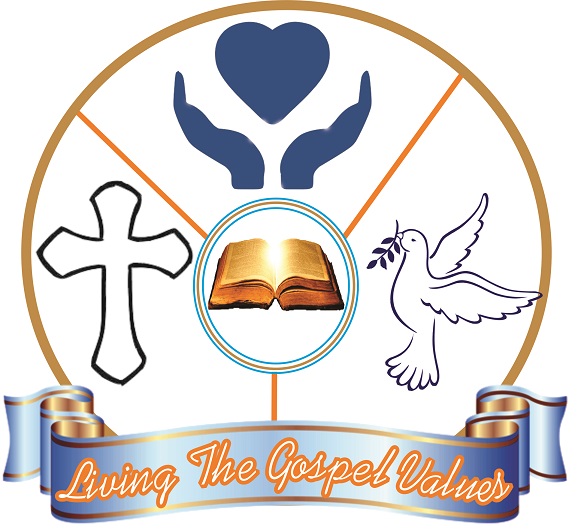Reflection on Today's Readings, 1st Sunday of Lent, Year B, February 20th, 2021
Texts: Gen. 9:8-15; Ps. 25:4-9; 1Pet. 3:18-22; Mark 1:12-15
After the flood, through which God renewed the face of the earth, He made covenant with the people who survived the flood. The covenant was that he would not destroy the living beings with flood again. It is said, "I establish my covenant with you, that never again shall all flesh be cut off by the waters of a flood, and never again shall there be a flood to destroy the earth.” Man shall no longer be cut off by waters of flood any longer, but shall become the means through which man's sins are washed away and man renewed. That which was the means through which the first generation was destroyed has become for us the means of salvation; as the new people, with whom God made the covenant, was saved through waters of the flood, so also we are saved through the water of baptism. As the waters of the flood washed away evils and sins from the face of the earth, so also the water of baptism washes away our sins and put an end to our evil nature and thus makes us a new creation, the new people of God. In the second reading, st. Paul tells us that the water of baptism in Jesus Christ cleanses deep to the consciences through the power of His resurrection. He says, "Baptism, which corresponds to this, now saves you, not as a removal of dirt from the body but as an appeal to God for a clear conscience, through the resurrection of Jesus Christ". The cleansing power of the water of baptism is greater than that of the waters of the flood. While the water of baptism makes man a new creation, the waters of the flood did not. The water of baptism cleanses the soul, not the body.
We are also told that God set His bow in the cloud as a sign of the covenant. It is said, "And God said, 'this is the sign of the covenant which I make between me and you every living creature that is with you, for all future generations: I set my bow in the cloud, and it shall be a sign of the covenant between me and the earth ...'". Bow appears when cloud gathered in the air and a downpour of water is signalled. The appearance of the bow reminds God of the covenant not to destroy life and earth with waters of flood again. The bow prefigures Jesus Christ who is in heaven reminding God the Father day and night of the covenant He established with us in His blood. The covenant is that of love, mercy and forgiveness. The presence of Jesus Christ in heaven is a reminder to God of His covenant to love us; it is the reminder of His covenant to show mercy to us and to forgive us our sins. Jesus Christ is not just a reminder like bow, but He is also an intercessor; He intercedes for us before God the Father. He mediates between us and God. We have the privilege of having God in Jesus Christ interceding for us.
The second reading also reminds us that the mercy and forgiveness of the covenant in Jesus Christ go beyond the living to include the dead. It is said, "Christ died for sins once for all, the righteous for the unrighteous, that he might bring us to God, being put to death in the flesh but made alive in the spirit; in which he went and preached to the spirits in prison, who formerly did not obey, when God’s patience waited in the days of Noah, during the building of the ark". This gives meaning to the doctrine of purgatory. This shows that death does not put an end to God's mercy and forgiveness; the power of His mercy and forgiveness is far greater than that of death.
Today's gospel reading speaks of the temptation of our Lord Jesus Christ and His call to repentance and faith in His gospel. St. Augustine tells us of the role of temptation in the life of Christians: "Our pilgrim life here on earth cannot be without temptation for it is through temptation that we progress and it is only by being tempted that we come to know ourselves. We cannot win our crown unless we overcome, and we cannot overcome unless we enter the contest and there is no contest unless we have an enemy and the temptation he brings." In the gospel the beginning of Jesus' mission is put immediately after His temptation to show that temptation brings about self-discovery and sense of mission. If we stay in Jesus Christ, we will always conquer temptation. St. Paul says, "Everyone, no matter how firmly he thinks he is standing, must be careful he does not fall. None of the trials which have come upon you is more than a human being can stand. You can trust that God will not let you be put to the test beyond your strength, but with any trial will also provide a way out by enabling you to put with it" (1Cor.10:12-13).
Jesus calls us to repentance and faith in the gospel. What marks the life of every baptised is repentance and faith in the gospel. Repentance is the giving up of old self to embrace a new self. The new self is lived in the light of the gospel and this is made possible by faith in the gospel.
Grant, almighty God, through the yearly observances of holy Lent, that we may grow in understanding of riches hidden in Christ and by worthy conduct pursue their effects. Amen. (Opening prayer).
Fr. Andrew Olowomuke









0 Comments